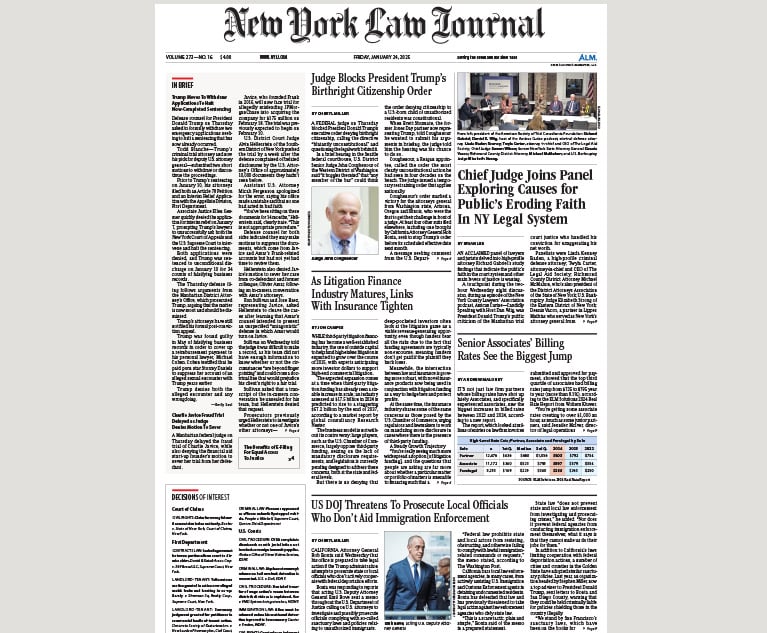Milberg Claims Former Partner Is Seeking to 'Squeeze the Last Nickel'
“After Schulman and others went to prison, the remaining partners of Milberg were left to pick up the pieces,” the firm said in its response to Steven Schulman's lawsuit.
February 04, 2019 at 01:38 PM
5 minute read
 Ariana Tadler, left, and Glenn Phillips, right.
Ariana Tadler, left, and Glenn Phillips, right.
Milberg is vigorously opposing a former partner's attempts to extract money from the firm after a merger, claiming that his demands would “pose a grave danger” to the firm's ability to continue representing clients.
The firm pointed to pressures—including lower profits and increasing competition—that led to a “strategic partnership” announced last year, and said the new Milberg firm created through the combination, Milberg Tadler Phillips Grossman, hasn't made any distributions of profits to partners.
Steven Schulman, a now-disbarred attorney and former equity partner of Milberg, filed suit last month against Milberg and the new firm, alleging he is owed more than $15 million under a 2009 court judgment. Schulman, one of several former Milberg partners convicted in a kickback scheme more than a decade ago, said the firm's 2018 name change was part of a “fraudulent scheme” to evade Milberg's creditors, including Schulman.
Shortly after filing suit, Schulman and his lawyers at Eisner filed more court papers to force Milberg, represented by Morrison Cohen, to immediately pay him amounts under the 2009 judgment. That judgment confirmed an arbitration award and directed Milberg to pay Schulman on a set schedule for certain funds, including his capital account and for his withdrawal from the firm.
Firing back in late January, Milberg said the court should deny Schulman's demands for immediate payments. The firm blamed him for the position Milberg found itself in, noting Schulman earned “fabulous wealth from Milberg.”
“He lied to many courts for many years, concealing the kickbacks he secretly paid that allowed him to obtain leadership positions in class actions and garner ever greater income for himself,” Milberg said, referencing Schulman's plea agreement.
All told, Milberg said it has paid Schulman over $10 million since Schulman's conviction and imprisonment. Milberg said Schulman received all payments due through November 2018.
“After Schulman and others went to prison, the remaining partners of Milberg were left to pick up the pieces,” the firm said.
Milberg explained that its competitors sought to persuade courts and clients that Milberg was not suited for leadership positions, “particularly in the types of cases that historically had been the lifeblood of Milberg and which had, at one time, generated large fees.”
“As the result of the crimes of Schulman and others, Milberg's profitability began to slowly and steadily decline, and Milberg resorted to borrowing to finance the prosecution of its contingency-fee cases,” the firm said.
These borrowings were also used to pay Schulman and other former partners, the firm said, and distributions available for actively working partners steadily decreased.
By 2017, Milberg had an inventory of pending contingent-fee cases, but these cases would require many years and substantial financial investment to bring to trial or settlement, the firm said. Meanwhile, “the significant debt that Milberg had incurred to finance its operations and pay former partners had matured,” Milberg said.
'Strategic Partnership'
Milberg argued it sought a “strategic partner” to better serve client interests and provide a “more stable platform.”
Under a September 2017 agreement, Milberg assigned substantially all of its assets to the newly created firm, Milberg Tadler Phillips Grossman, including active Milberg cases, all rights to client relationships, as well as client receivables for disbursements in all but a few cases. (The new firm was a result of a “strategic partnership” with Sanders Phillips Grossman, a national mass torts and personal injury firm, according to a January 2018 press release.)
In exchange, Milberg Tadler agreed to assume or resolve certain contractual obligations of Milberg, resolve about $5 million of Milberg's then-outstanding accounts payable and to grant Milberg a 49 percent interest in Milberg Tadler.
While the new firm has the ability to meet its “other financial obligations necessary” for the representation of clients, such as rents, salaries and case disbursements, Milberg said, the new firm has not made any distributions of profits to any of its partners and does not expect to make any distributions in the near future.
(The firm said two equity partners of Milberg Tadler “have received a modest salary for their work.”)
This is the case, Milberg said, because contingency cases take a long time to resolve and require enormous investment. The new firm must apply any revenues it generates to prosecute cases, it said. As a law firm, its “first duty must be to its clients, and not to wealthy former partners seeking to squeeze the last nickel possible out of Milberg,” the firm said.
“Currently, [Milberg Tadler] owes Milberg only potential future profits if and when the pending contingency fee cases are settled or brought to verdict,” Milberg said. “Currently, Milberg has no partnership net income to pay Schulman or any other Milberg creditors.”
Allowing Schulman—”an extremely wealthy man”—to restrain Milberg Tadler funds and bring its “operations to a halt would pose a grave danger” to the firm's ability to continue to represent its clients, the firm argued.
The parties argued before Manhattan Supreme Court Justice Jennifer Schecter on Feb. 1. The judge urged the parties to resolve the issue themselves, asking them to appear again in court on Tuesday.
In a statement Feb. 1, Simon Miller, the Eisner partner representing Schulman, along with partner Leslie Corwin, said he disagrees with Milberg and stands with the arguments in his client's court papers.
The Morrison Cohen partner representing Milberg, David Piedra, did not return a call seeking comment.
This content has been archived. It is available through our partners, LexisNexis® and Bloomberg Law.
To view this content, please continue to their sites.
Not a Lexis Subscriber?
Subscribe Now
Not a Bloomberg Law Subscriber?
Subscribe Now
NOT FOR REPRINT
© 2025 ALM Global, LLC, All Rights Reserved. Request academic re-use from www.copyright.com. All other uses, submit a request to [email protected]. For more information visit Asset & Logo Licensing.
You Might Like
View All
Paul Hastings, Recruiting From Davis Polk, Adds Capital Markets Attorney
3 minute read
Neighboring States Have Either Passed or Proposed Climate Superfund Laws—Is Pennsylvania Next?
7 minute readTrending Stories
- 1No Two Wildfires Alike: Lawyers Take Different Legal Strategies in California
- 2Poop-Themed Dog Toy OK as Parody, but Still Tarnished Jack Daniel’s Brand, Court Says
- 3Meet the New President of NY's Association of Trial Court Jurists
- 4Lawyers' Phones Are Ringing: What Should Employers Do If ICE Raids Their Business?
- 5Freshfields Hires Ex-SEC Corporate Finance Director in Silicon Valley
Who Got The Work
J. Brugh Lower of Gibbons has entered an appearance for industrial equipment supplier Devco Corporation in a pending trademark infringement lawsuit. The suit, accusing the defendant of selling knock-off Graco products, was filed Dec. 18 in New Jersey District Court by Rivkin Radler on behalf of Graco Inc. and Graco Minnesota. The case, assigned to U.S. District Judge Zahid N. Quraishi, is 3:24-cv-11294, Graco Inc. et al v. Devco Corporation.
Who Got The Work
Rebecca Maller-Stein and Kent A. Yalowitz of Arnold & Porter Kaye Scholer have entered their appearances for Hanaco Venture Capital and its executives, Lior Prosor and David Frankel, in a pending securities lawsuit. The action, filed on Dec. 24 in New York Southern District Court by Zell, Aron & Co. on behalf of Goldeneye Advisors, accuses the defendants of negligently and fraudulently managing the plaintiff's $1 million investment. The case, assigned to U.S. District Judge Vernon S. Broderick, is 1:24-cv-09918, Goldeneye Advisors, LLC v. Hanaco Venture Capital, Ltd. et al.
Who Got The Work
Attorneys from A&O Shearman has stepped in as defense counsel for Toronto-Dominion Bank and other defendants in a pending securities class action. The suit, filed Dec. 11 in New York Southern District Court by Bleichmar Fonti & Auld, accuses the defendants of concealing the bank's 'pervasive' deficiencies in regards to its compliance with the Bank Secrecy Act and the quality of its anti-money laundering controls. The case, assigned to U.S. District Judge Arun Subramanian, is 1:24-cv-09445, Gonzalez v. The Toronto-Dominion Bank et al.
Who Got The Work
Crown Castle International, a Pennsylvania company providing shared communications infrastructure, has turned to Luke D. Wolf of Gordon Rees Scully Mansukhani to fend off a pending breach-of-contract lawsuit. The court action, filed Nov. 25 in Michigan Eastern District Court by Hooper Hathaway PC on behalf of The Town Residences LLC, accuses Crown Castle of failing to transfer approximately $30,000 in utility payments from T-Mobile in breach of a roof-top lease and assignment agreement. The case, assigned to U.S. District Judge Susan K. Declercq, is 2:24-cv-13131, The Town Residences LLC v. T-Mobile US, Inc. et al.
Who Got The Work
Wilfred P. Coronato and Daniel M. Schwartz of McCarter & English have stepped in as defense counsel to Electrolux Home Products Inc. in a pending product liability lawsuit. The court action, filed Nov. 26 in New York Eastern District Court by Poulos Lopiccolo PC and Nagel Rice LLP on behalf of David Stern, alleges that the defendant's refrigerators’ drawers and shelving repeatedly break and fall apart within months after purchase. The case, assigned to U.S. District Judge Joan M. Azrack, is 2:24-cv-08204, Stern v. Electrolux Home Products, Inc.
Featured Firms
Law Offices of Gary Martin Hays & Associates, P.C.
(470) 294-1674
Law Offices of Mark E. Salomone
(857) 444-6468
Smith & Hassler
(713) 739-1250








